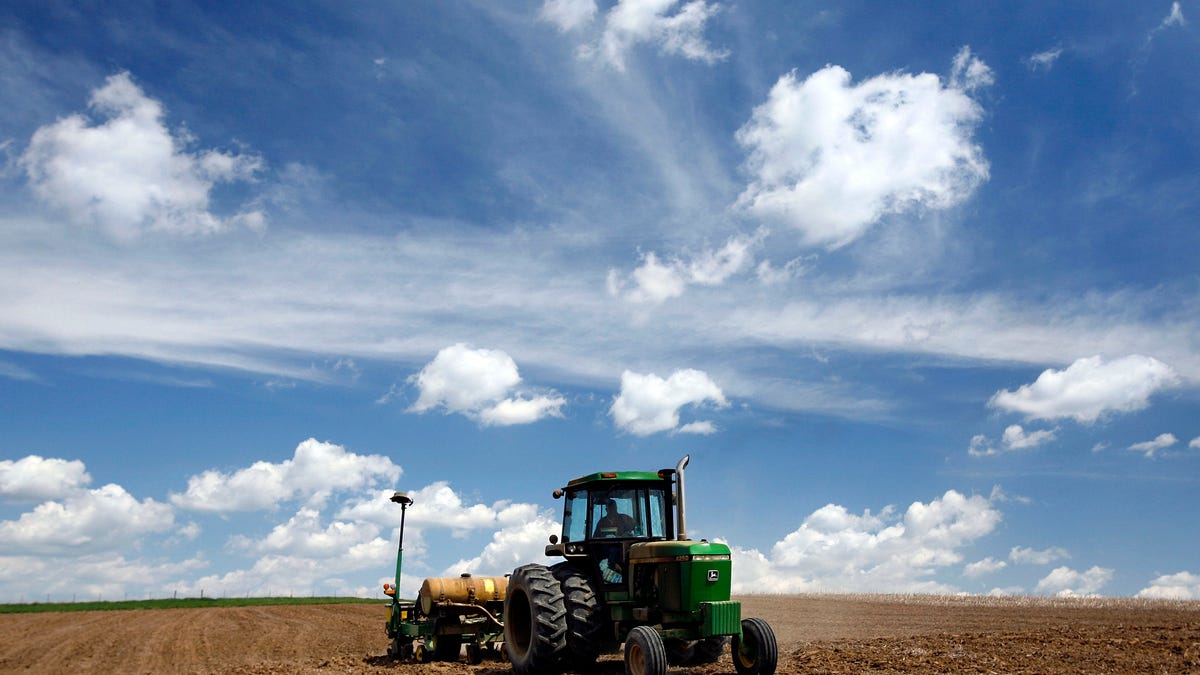Biden slammed over 'problematic' water regulation that could lead farmers to foot the bill: John Boyd, Jr.
John Boyd, Jr., president of the National Black Farmers Association, slams an environmental regulation that he claims could hinder farmers' everyday operations and raise costs.
A coalition of 24 states filed a federal lawsuit against the Biden administration Thursday, arguing a recent environmental regulation is unlawful and would harm their residents.
The states — led by West Virginia, Georgia, Iowa and North Dakota — said in the lawsuit that the so-called Waters of the United States (WOTUS) rule unveiled in late December is an attack on their sovereign authority regulating bodies of water and surrounding land. The lawsuit named the Environmental Protection Agency (EPA) and U.S. Army Corps of Engineers, the two agencies that signed off on the rule, as defendants in the case.
"This new final rule is a decades-long effort by the EPA to regulate purely intrastate waters without the explicit consent of Congress," West Virginia Attorney General Morrisey said during a press conference Thursday. "This is yet another attempt from unelected bureaucrats to expand their own authority by broadly defining Waters of the United States."
"This is a textbook case of federal overreach," he added. "It's a crazy rule and completely contravenes the Constitution and the way we think the structure of our federal and state government relations should operate. In the rule, EPA asserts federal jurisdiction over land and water that has no connection to navigable waters. This goes beyond what the statute provides in the Constitution."

West Virginia Attorney General Patrick Morrisey speaks in Inwood, West Virginia, in 2018. (Win McNamee/Getty Images)
On Dec. 30, the last working day of 2022, the EPA and the U.S. Army Corps of Engineers quietly announced they had approved the WOTUS regulation and that it would be implemented in March. After announcing it, EPA Administrator Michael Regan said the rule "safeguards our nation’s waters."
The rule ultimately opens the door for the federal government to regulate wetlands, lakes, ponds, streams and "relatively permanent" waterways, largely mimicking a pre-2015 environmental rule set during the Obama administration which implemented the changes in an effort to curb water pollution. The regulation is a broad interpretation of which water sources require protection under the Clean Water Act.
FARMERS SLAM BIDEN OVER LATEST ECO REGULATION TARGETING BUSINESSES: 'FEDERAL OVERREACH'
The Trump administration had reversed the Obama-era rules, loosening federal protections on water sources, such as puddles and ditches, that it didn't consider navigable waterways or in need of federal oversight. A federal court, though, struck down the reversal in 2021 and implemented a WOTUS interpretation that isn't as far-reaching as the Obama administration's rule.

Environmental Protection Agency Administrator Michael Regan speaks in North Carolina on April 14, 2022. (AP Photo/Carolyn Kaster, File)
"Do you guys remember the word ‘navigable’?" Morrisey said Thursday. "Growing up, I used to think about it as something that a boat can use, ships and boats. You don't think of backyard ditches and ephemeral streams. That's in excess of what powers Congress has delegated to the EPA and clearly, we think, outstrips what's allowed to even be regulated under the Interstate Commerce clause.
"Think ‘navigable’ and then you begin to understand just how far-reaching this rule is. We think that the rule extends to lands that contain moisture and exist within some undefined proximity to other water, it can extend to dry channels and places that formerly contained water, it extends to impoundments that contain waters. So, there are a lot of issues with this rule."
BIDEN EPA PROPOSES REGULATION THAT FARMERS WARN WILL DRIVE FOOD PRICES HIGHER
In the aftermath of the rule proposal, farmers, landowners, energy developers and lawmakers have raised the alarm that it would create confusion and regulatory burdens. They have warned that Americans may face jail time and significant fines for making changes to their own property under the rule.

An Iowa farmer pulls a corn planter. (Mark Hirsch/Getty Images)
Nearly 200 House Republicans signed a letter to Regan and Michael Connor, the assistant secretary of the Army for civil works, asking the officials to rescind the rule.
The lawmakers also argued the timing was inappropriate since the Supreme Court is expected in the coming months to issue a ruling in Sackett v. EPA, a case concerning the federal government's ability to regulate waterways. The plaintiffs in the case are challenging the EPA's authority to block construction of a home on a lot in Idaho they own.
CLICK HERE TO GET THE FOX NEWS APP
In addition to West Virginia, Georgia, Iowa and North Dakota, Alabama, Alaska, Arkansas, Florida, Indiana, Kansas, Louisiana, Mississippi, Missouri, Montana, Nebraska, New Hampshire, Ohio, Oklahoma, South Carolina, South Dakota, Tennessee, Utah, Virginia and Wyoming also joined the lawsuit.
The EPA didn't immediately respond to a request for comment.















































